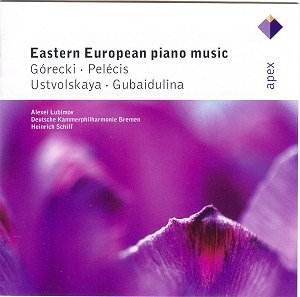I
suppose it is only understandable given the specialist nature
of the repertoire that this recording has so quickly made it into
the super-budget range (it was originally issued by Erato Disques
in 1996). The programming has a point: Ustvolskaya represents
the ‘pre-avant-garde’; Gubaidulina the avant-garde and Górecki
and Pelécis the ‘post-avant-garde’
The
Ustvolskaya is actually dedicated to Lubimov, so this recording
is actually a useful historical document in its own right. If,
as Catherine Steinegger suggests in her booklet notes, the work
appears to ‘reflect the oppressive atmosphere into which the Soviet
Union was plunged after the Second World War’, then it succeeds
in its remit. Unrelentingly bleak it certainly is, right from
the opening’s determined tread. The influence of her teacher at
the Leningrad Conservatory (Shostakovich, no less) is evident
in the spiky writing around the two minute mark, and also in the
ensuing counterpoint. There is much delicacy here, also (the word
‘hyper-delicate’ sprang to mind whilst listening: it is amazing
how often prefixes of the ilk of ‘hyper’ and ‘ultra’ crop up in
relation to Ustvolskaya’s music). The overall impact is monumental,
despite the relative brevity of timing. The repetitive nature
of the ending could almost be mystical in effect: not here, unfortunately.
There is an alternative version on Megadisc (MDC7856,
with Oleg Malov as pianist). Megadisc is a company that has done
so much to further this composer’s cause. For an introduction
to this fascinating composer’s music, try MDC7858,
which includes the Fourth Symphony and the Fifth Piano Sonata.
Dedicated
to Alexander Backchiev, Sofia Gubaidulina’s Introitus dates
from 1978. The title makes reference to the instrumental piece
that introduces a Mass. This is very gestural, indefinably elusive
music that nevertheless exudes an aura of peace. Texture is foregrounded,
becoming the primary copositional parameter (there are some lovely
washes of sound from the soloist, and some equally lovely trills
near the end). The piece dies, beautifully, into the silence from
which it emerged. It is most sensitively realised in this instance
(there is a recording on BIS also by Béatrice Rauchs and
the Kiev Chamber Players, the same performance appearing on both
CD853 and CD898).
Górecki
dedicated his Concerto for Piano and String Orchestra to
the super-virtuoso keyboardist Elisabeth Chojnacka (best known
as a harpsichordist). The repetitions of the first of the two
movements are aggressive rather than hypnotic, and the end of
this movement seems almost Bluetak-ed on. True, the second movement
has more life, but the eight minutes of the complete piece do
seem so much longer than the 17 and 24 minutes of the Ustvolskaya
and Górecki, respectively.
Finally
a piece by a pupil of Khachaturian, Latvian composer Georgs Pelécis.
Neo-classical in intent, there is a delicacy to the first movement
of the Concerto bianco (nostalgia also creeps in). But
nothing really to prepare one for the diabetes-inducing sugariness
of the second movement, ‘Con venerazione’, complete with music-box
imitation from the piano. It must be admitted that there is a
certain intimacy to the playing here and the climax is the effective
result of its preparations; the finale is jolly enough, bouncing
along in its own predictable way.
The
booklet notes refer to ‘these disparate and highly contrastive
works’, and that is certainly true. Almost something for everybody.
This die-hard modernist never wants to hear the Concerto bianco
again, though.
Colin
Clarke
